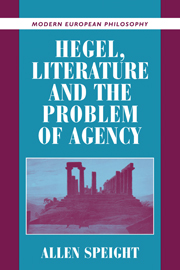Book contents
- Frontmatter
- Contents
- Acknowledgments
- Introduction
- 1 “Hegel's Novel”: The Phenomenology of Spirit and the Problem of Philosophical Narrative
- 2 Tragedy and Retrospectivity: Hegel's Antigone
- 3 Comedy and Theatricality: Desire, Bildung, and the Sociality of Agents' Self-Knowledge
- 4 Forgiveness and the Romantic Novel: Contesting the Beautiful Soul
- 5 From the Phenomenology to the Philosophy of Right: Hegel's Concept of the Will and the Possibility of Modern Ethical Life
- Selected Bibliography
- Index
2 - Tragedy and Retrospectivity: Hegel's Antigone
Published online by Cambridge University Press: 18 November 2009
- Frontmatter
- Contents
- Acknowledgments
- Introduction
- 1 “Hegel's Novel”: The Phenomenology of Spirit and the Problem of Philosophical Narrative
- 2 Tragedy and Retrospectivity: Hegel's Antigone
- 3 Comedy and Theatricality: Desire, Bildung, and the Sociality of Agents' Self-Knowledge
- 4 Forgiveness and the Romantic Novel: Contesting the Beautiful Soul
- 5 From the Phenomenology to the Philosophy of Right: Hegel's Concept of the Will and the Possibility of Modern Ethical Life
- Selected Bibliography
- Index
Summary
Action (Handlung) in its original Greek sense is a stepping-forth (Heraustreten) from an undivided consciousness.
Hegel, AestheticsTragedy is the first of the three moments of agency that Hegel considers, because it is the moment from which the other moments “step forth” or break open into view. As we shall see, understanding what action is and how it can be justified is, for Hegel, an inherently retrospective practice of a sort that bears a remarkable similarity to the task facing the tragic agent and spectator.
Like more recent interpreters of tragedy such as Walter Benjamin and Franz Rosenzweig, Hegel was impressed by the silence of the ancient tragic heroes – and was led to think about the agent or self involved in Greek tragedy in terms of what comes to be visible in an agent's action once it is done. The account Hegel gives of the tragic character of action takes on its more distinctive (and distinctly Hegelian) coloration in the concern it has for the ultimate articulation of what emerges from that initially inarticulate silence: for Hegel, what is at issue in ancient tragedy is some notion of an implicit reflectiveness in action that is not yet explicitly articulated. Action is thus seen as beginning from a prereflective sense of a whole that can be articulated only in the action itself.
Hegel's interest in the character of action in ancient tragedy was not an antiquarian one, but stemmed in fact from a consideration of distinctly modern difficulties in giving an account of agency.
- Type
- Chapter
- Information
- Hegel, Literature, and the Problem of Agency , pp. 42 - 67Publisher: Cambridge University PressPrint publication year: 2001



